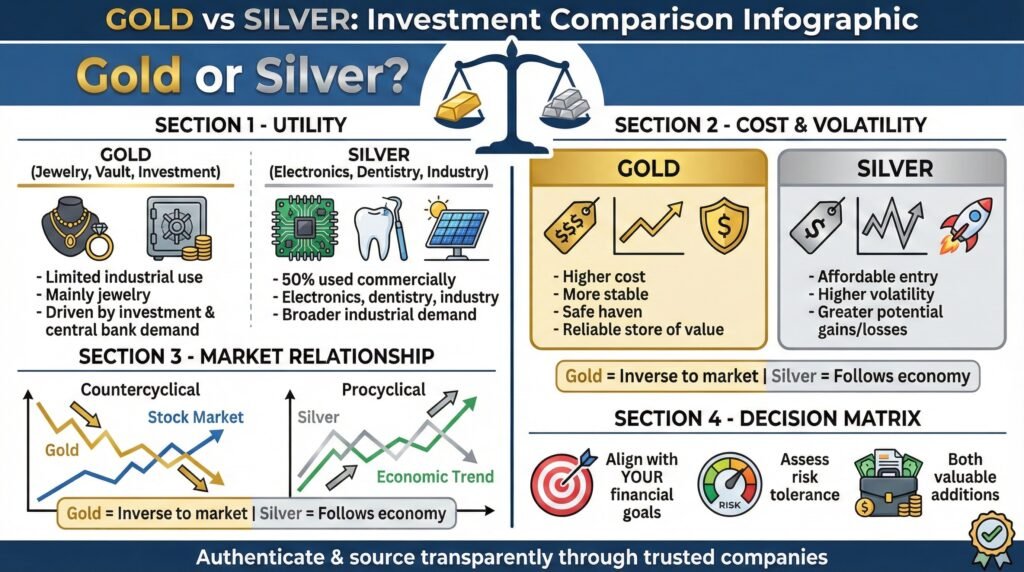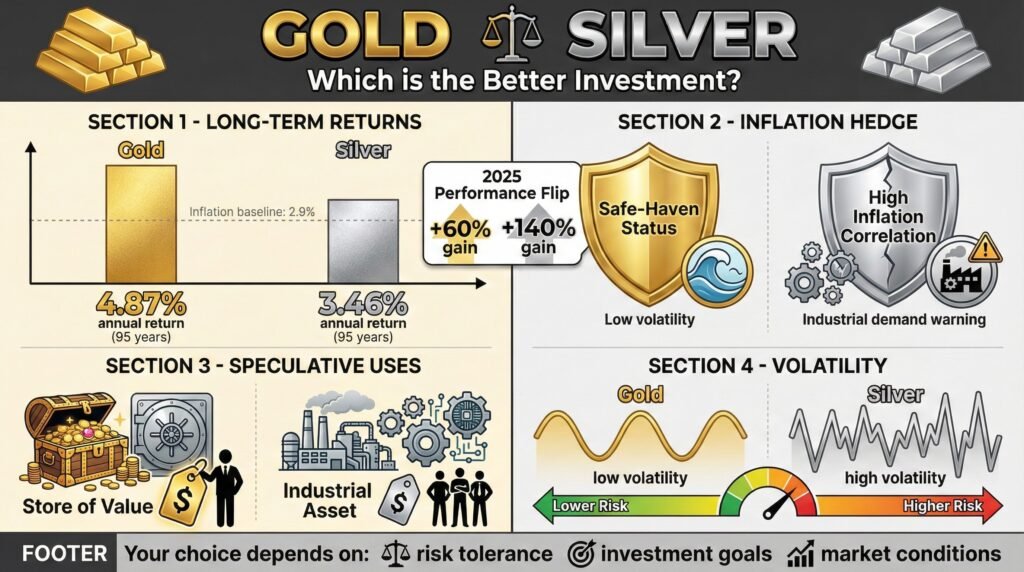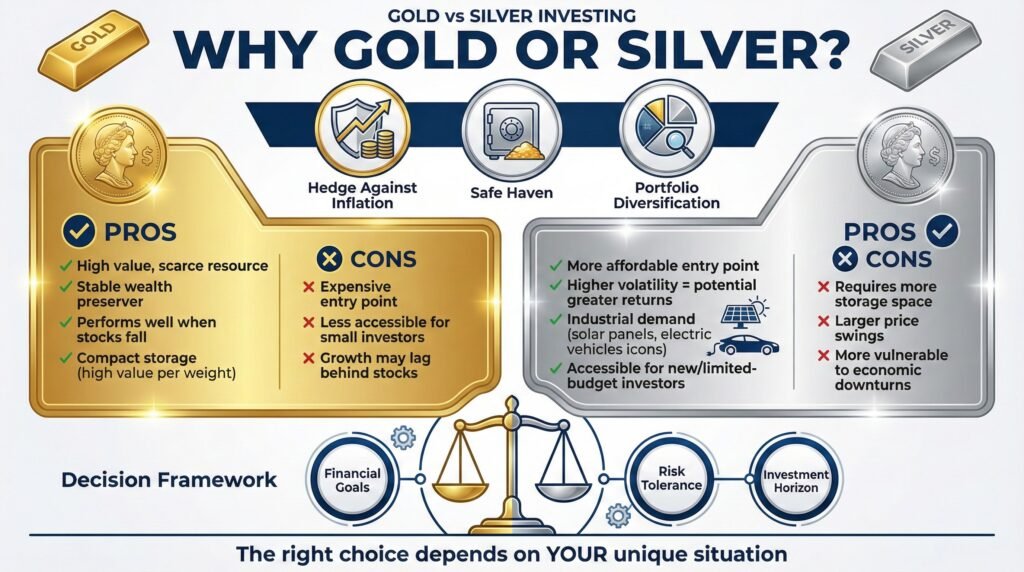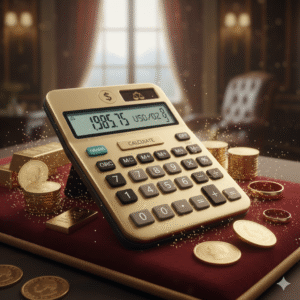Which Would You Rather Have Gold or Silver?

You’re about to dive into the world of precious metal investments. You’re torn between gold and silver, aren’t you? Don’t worry, you’re not alone.
Gold and silver each have their unique benefits and risks depending on your investment goals. Gold has traditionally seen as a store of value and inflation hedging, where silver has additional value for industrial uses. To better understand which you would rather own as an investor, gold or silver, we will cover the following:
- Gold vs. Silver Investments: Which Is Better?
- Which is the better investment?
- Pros and Cons of investing in gold
- Pros and Cons of investing in silver
- Why Gold Or Silver
- Would You Rather Own Silver or Gold?
- Best Gold and Silver Investment Companies
We’ll break down the pros and cons, helping you to make an informed decision.
So, are you ready to discover whether it’s gold or silver that should be filling your treasure chest?
Gold vs. Silver Investments: Which Is Better?
When comparing gold and silver investments, it’s crucial to understand their unique characteristics. Consider factors such as utility, cost, volatility, and market relationships to discern which metal might better align with your financial objectives.
Let’s dissect these aspects to help you make an informed decision.
Gold vs. Silver: Utility
While you may think gold is the superior investment due to its high value, it’s important to consider that silver has a wider range of industrial uses, which can impact its market value.
Around half of all silver traded is used commercially, in areas from electronics to dentistry. This industrial demand provides a certain level of price stability and potential for growth, as industries expand and evolve.
Gold, on the other hand, has limited industrial applications beyond jewelry. Its value is largely driven by investment and central bank demand. Therefore, when deciding between gold and silver, consider not only their market values but also their utility. These factors can influence the metals’ price movements, offering unique investment opportunities.
Gold vs. Silver: Cost and Volatility
Why should you consider the cost and volatility when deciding between investing in gold or silver?
Well, it comes down to your risk tolerance, investment goals, and available capital.
Silver, being more affordable, allows for easier entry into the precious metals market. However, its lower cost also means higher volatility, with small price changes having a larger impact on your investment.
Gold, on the other hand, is more expensive but also more stable, offering a safer but potentially less exciting investment.
Consider these points:
- Silver’s affordability is attractive for new investors.
- Gold’s stability provides a safe haven during economic downturns.
- Silver’s volatility could lead to significant gains, but also potential losses.
- The cost of gold might limit the quantity you can purchase, but it offers a reliable store of value.
Gold vs. Silver: Relationship to Broader Market
In evaluating whether gold or silver investments are better for you, it’s crucial to consider their relationship to the broader market.
Gold is a countercyclical investment, its price often moving inversely to the stock market. This makes gold a safe haven during economic downturns, providing liquidity when stocks are undervalued. You can sell gold to buy these assets, avoiding selling your own at a loss.
Conversely, silver’s price tends to align more with the economy due to its industrial uses. In a slowdown, the industry needs less silver, driving prices down. Therefore, while gold provides stability in a volatile market, silver’s value may fluctuate more with economic trends.
Your choice should align with your financial goals and risk tolerance.
Gold vs. Silver: Which Should You Buy?
When considering whether to invest in gold or silver, you’ll need to weigh the pros and cons of each based on your financial goals and risk tolerance.
- Gold is often seen as a safer bet for long-term stability, especially during economic downturns.
- Silver, while more volatile, can offer higher returns when the market is strong.
- Gold requires less storage space, making it a more convenient choice for some.
- Silver, despite its volatility, can also serve as a hedge against inflation, just like gold.
Ultimately, the decision between gold and silver is highly personal. Whether you’re safeguarding against bad times with gold or speculating for good times with silver, either choice can serve as a valuable addition to your investment portfolio.
It can’t be understated; gold and silver are both valuable commodities and need to be authenticated and sourced transparently. A long-established and trusted gold investment company can guide in navigating the present markets and assist in investment timing.
Tap the banner to visit Birch Gold Group’s official site to receive a free gold and silver investment guide from an established company. Get started protecting our retirement savings today.

Which is the better investment?
When considering gold versus silver as an investment, it’s crucial to assess certain key factors.
Think about how you’d prefer to own it, the long-term returns you’re seeking, and how each metal serves as an inflation hedge.
Also, it’s worth examining their speculative uses and understanding their levels of volatility.
Long-term returns
If you’re looking at long-term returns, you’ll find that gold has historically outperformed silver, making it a potentially more lucrative investment. Over a span of 95 years, gold has returned 4.87 percent compounded annually, while silver has lagged at 3.46 percent.
In light of inflation, however, these returns mightn’t seem as impressive. Inflation has averaged around 2.9 percent during the same period, cutting into these gains. Despite this, gold’s track record remains superior, underlining its role as a safe-haven asset.
Yet, it’s important to remember that these are historical trends and past performance isn’t a guarantee of future returns. Your decision between gold and silver should also factor in your investment goals, risk tolerance, and market conditions.
However, recently silver and gold have been competing on relatively equal footing. In 2025, gold price appreciation exceeded 60%, but silver surpassed with over a 140% gain.
Inflation hedge
In considering gold and silver as hedges against inflation, you’ll find that each metal has its unique advantages and disadvantages.
Gold is traditionally seen as the safer bet with its reputation as a safe-haven asset. When inflation rises, investors often flock to gold, making it a reliable choice.
Silver, on the other hand, has a high correlation with inflation, but it’s not as solid as gold.
Here are some points to ponder:
- Gold’s safe-haven status makes it less volatile during economic uncertainties.
- Silver’s value is steadier amid inflation but can be affected by industrial demand.
- Both gold and silver can offer protection against inflation, but their performance may vary.
- It’s crucial to weigh these factors against your investment goals and risk tolerance.
Speculative Uses
When it comes to speculative uses, you might wonder whether gold or silver would make a better investment.
Gold, primarily an investment asset, is typically used as a store of value. Its high price per ounce allows investors to store value efficiently, and it draws demand from the investment sector.
On the other hand, silver, being more industrially inclined, performs well during periods of economic growth. Its lower price per ounce makes it more accessible, attracting smaller and retail investors. However, silver’s price is more volatile, presenting a higher risk.
Therefore, your choice between gold and silver as a speculative investment would depend on your risk tolerance, investment goals, and perception of market conditions.
Volatility
Considering your risk tolerance, you might be wondering which is a better investment in terms of volatility – gold or silver. While both precious metals offer benefits, their volatility varies quite a bit.
- Silver, being more affordable, can be more volatile due to its lower liquidity, especially in the financial market.
- Gold, while pricier, tends to be less volatile, making it a more stable investment for those with lower risk tolerance.
Silver’s price can swing considerably in the short term, making it a riskier bet than gold. Investment in gold or silver should align with your portfolio risk management requirements.
Ways to own it
Your choice between gold and silver investments depends heavily on your specific financial goals, risk tolerance, and investment strategy. Each precious metal offers various ways of investment, each with its own pros and cons. You might want to consider:
- Physical Bullion: This direct method requires secure storage and the advantage of no counterparty default risk.
- Futures: A contract to buy at a later date, these can be risky but potentially profitable.
- ETFs owning the metal: These offer security and ease but may come with management fees, but involve potential counterparty risk.
- Mining stocks or ETFs owning them: These offer leverage on prices but carry the risk inherent in stocks due to extreme volatility
Understanding the dynamics of each type of investment will enable you to make an informed decision that best suits your investment needs and goals.
Benefits of Working with a Reputable Gold Investment Company
When starting on the path of gold investing, working with a credible and trustworthy precious metals vendor is key. Finding an established gold investment company that understands the many vacillations of the gold markets and the numerous variables affecting its price will save much time and hassle.
Working with a reputable company with institutional knowledge can assist you with logical price entry points, positioning, and dollar-cost-averaging so you can maximize your investment capital.
Gold IRAs provide additional advantages over merely buying gold from a local dealer. Furthermore, these companies can provide serious gold investors access to competitive prices, transparency, a sound buyback policy, reliable customer service, and robust security protection of their precious metal investments.
To learn more about how gold investing can protect your long-term wealth and the advantages of tax-deferred gold and silver IRAs, click the banner below to access and download Augusta Precious Metals’ free gold IRA checklist to make sure you are aware of all aspects of the gold IRA process:
Pros and Cons of Investing in Gold
Before you choose between gold and silver, it’s crucial to consider the pros and cons of investing in each.
With gold, you’re looking at a stable asset that often increases in value when other investments falter. However, you also have to wrestle with higher costs and potential storage issues.
Weighing these factors will help you make an informed decision that aligns with your financial goals.
Pros
You may find that gold’s extrinsic value gives it a unique advantage as it’s not only a precious metal, but also used in jewelry, electronics, and medicine.
It’s also simple to purchase, available through various platforms such as reputable dealers, pawn shops, and even individual sellers.
Interestingly, gold’s value tends to rise when other assets fall, establishing it as a counter-cyclical investment.
Gold has an extrinsic value
Often, you’ll find that gold holds extrinsic value beyond its status as a precious metal, used widely in industries like jewelry, electronics, and medicine.
- Gold’s high conductivity makes it ideal for electronic devices.
- It’s resistant to bacteria and corrosion, making it valuable in medicine.
- Its aesthetic appeal drives its use in jewelry.
- Gold’s resistance to tarnish increases its longevity, enhancing its value.
Gold is easy to buy
So, why is gold easy to buy?
There’s a multitude of accessible avenues for you to purchase this precious metal. From reputable dealers to pawn shops and individual sellers, gold is readily available.
This accessibility, combined with its recognized value, makes gold an attractive and straightforward investment. However, be mindful of potential scams and always research before purchasing to ensure you’re getting genuine gold.
Gold has an inverse relationship with other assets
When it comes to your investment strategy, gold’s inverse relationship with other assets can work to your advantage.
- Gold often rises when other markets fall, providing a safety net for your portfolio.
- It’s countercyclical, offering a balance against stock market volatility.
- Historically, gold’s value has increased during market crashes.
- This opposing trend to traditional markets can help diversify and spread risk, strengthening your investment strategy.
Cons
While gold investment may seem appealing due to its intrinsic value and market stability, there are drawbacks to consider.
First, it’s often priced higher than silver, making the initial investment substantial.
Additionally, it may not offer the best growth potential over time and the cost of secure storage can also be a significant factor.
Gold can be expensive
Despite its numerous advantages, you should bear in mind that investing in gold can be quite expensive.
- It’s currently priced around $1,800 per ounce, quite a steep amount for an initial investment.
- Its high value can lead to costly storage fees.
- Its price volatility can potentially lead to losses.
- The high cost may limit the amount you can diversify within your portfolio.
- Gold is not the best growth vehicle
Why wouldn’t you consider gold the best investment for growth?
While it’s a safe haven during economic downturns, it’s not the top growth vehicle.
The S&P 500 has outpaced gold, with a 484% increase compared to gold’s 360% from 1990 to 2020.
Gold’s growth potential is, thus, less robust than equities over time.
It’s vital to balance your portfolio with diverse assets for optimal growth.
Storage can be costly
So, you’re considering investing in gold, but have you factored in the storage costs? These fees can significantly impact your return on investment.
- Commercial storage facilities charge from 0.5% to 2% of the value of your holdings.
- High-value investments require more expensive storage solutions.
- Secure storage facilities can be scarce.
- Costly insurance may be necessary to protect your investment.
Understanding these costs is vital in your investment decision.
Pros and Cons of Investing in Silver
Now, let’s switch gears to silver.
As you consider investing in silver, it’s crucial to weigh the pros and cons. From its versatility in various industries to its price volatility, understanding these factors can guide your investment decisions.
Pros
You might find silver an attractive investment option as it’s typically less pricey than gold, making it more accessible.
Its wide range of applications in various industries, from electronics to medicine, adds to its appeal.
Plus, the tangibility of silver offers a sense of security that can’t be derived from digital assets.
Silver is less expensive than gold
Consider the affordability of silver, as its abundant supply makes it less expensive than gold. Here are a few key points to ponder:
- Silver allows for a more accessible entry into precious metal investing.
- Its lower price can provide more flexibility in adjusting your portfolio’s balance.
- Potential for higher quantities can offer a better spread of risk.
- Silver’s affordability makes it a potential choice for long-term investments.
Silver has more uses
Beyond its affordability, silver’s extensive industrial applications also make it a compelling investment choice. It’s a key component in high-growth sectors like solar energy and electric vehicles.
This broad utility not only creates a steady demand but also offers a level of insulation against economic downturns. However, remember that this industrial demand can also make silver’s value more tied to economic cycles.
Silver is tangible
Owning silver gives a sense of security, as it’s a tangible asset that you physically possess and can hold in your hand.
- It’s a hedge against inflation, retaining its value over time.
- You’re not reliant on banks or financial systems.
- It’s a tradable commodity in any economy.
- Unlike digital assets, you’re not vulnerable to technological failures or cyber threats.
Cons
While silver may seem an appealing investment, it’s crucial to consider its potential drawbacks.
Its volatility can lead to significant price swings and potential losses, especially during economic downturns when demand may dip.
Additionally, storing silver can pose challenges due to its bulk relative to its value.
Silver is more volatile
Although you may be enticed by the potential for higher returns, it’s important to understand that silver’s prices can be two to three times more volatile than gold, which could increase the risk in your portfolio.
- Silver’s price can fluctuate greatly
- Higher volatility can lead to larger losses
- Market conditions can drastically impact silver’s value. Therefore, investing in silver may be more suitable for risk-tolerant, short-term investors.
Less demand during a downturn
When the economy takes a downturn, you’ll often find that the demand for silver decreases. This is due to silver’s extensive use in industries, which slows during economic slumps, reducing silver’s value.
While beneficial in a thriving economy, this industrial reliance can be a drawback in recessions. Hence, silver’s worth can be more volatile, making it a potentially riskier investment during uncertain economic times.
Silver is harder to store
On top of the risk associated with its demand during downturns, you’ll find that silver also presents a significant storage challenge.
- It’s a whopping 84% larger in volume than gold.
- Storing silver could need up to 128 times more space than gold.
- This makes safekeeping more complex and potentially more costly.
- It’s an important consideration when deciding between these two precious metals.
Best Gold and Silver IRA for Low Investment Minimums. Click the Banner Below to Receive a Free Investment Guide Today.

Why Gold Or Silver
Even if you’re new to investing, you’ve likely heard that gold and silver can be valuable additions to your portfolio, haven’t you? These precious metals can serve as a hedge against inflation, a safe haven in times of economic uncertainty, and a means to diversify your investment portfolio.
Gold, due to its scarcity, holds a higher value compared to silver. It’s seen as a stable investment, a wealth preserver that tends to hold its value over time. When stock markets tumble, gold often shines. It’s also easier to store due to its high value per unit of weight. But there’s a catch: it comes with a hefty price tag, making it less accessible for small investors.
Silver, on the other hand, is more volatile and prone to larger price swings. This may sound risky, but it also means there’s a potential for greater returns. It’s more affordable than gold, making it an accessible entry point for new investors or those with limited funds.
Plus, silver’s wide industrial use, especially in high-growth sectors like solar energy and electric vehicles, adds to its appeal.
However, both gold and silver aren’t without their cons. Gold can be expensive, and its growth rate may lag behind stocks over time. Silver, while cheaper, requires more storage spac,e and its value is more susceptible to economic downturns.
In essence, whether you opt for gold or silver depends on your financial goals, risk tolerance, and investment horizon. It’s about striking the right balance in your portfolio.
Would You Rather Own Silver or Gold?
So, you’re faced with the compound choice: owning gold or silver, which would you rather go for? This decision isn’t as simple as it may seem. Both precious metals come with their own set of pros and cons. It’s crucial to evaluate these points to make an informed choice.
Let’s break it down:
- Gold is considered a safe-haven asset, often holding or increasing its value during market downturns. It’s less volatile and assures you of stability. However, it’s more expensive, and its storage can bring additional costs.
- Silver, on the other hand, is more affordable and has a wider range of industrial applications. This could mean potential growth if these industries flourish. Yet, it’s more volatile, and its value can significantly fluctuate, bringing a higher risk.
Recent market trends show a decline in gold prices due to a stronger dollar and anticipated changes in the Federal Reserve’s stimulus program. Silver also has its challenges, with prices dropping due to heavy fund liquidation and weak fundamentals.
- The choice between gold and silver largely depends on your investment goals, risk tolerance, and market outlook.
- If you’re looking for stability and have a budget, gold might be your best bet. But if you’re willing to take on more risk for potentially higher returns, then silver could be an attractive option.
Having a means of tracking the price of gold and silver is crucial in order to track the short and long-term progress of your investment.
Calculate the current market value of your gold and silver based on weight, purity, and live market prices. Get instant estimates for selling or buying gold jewelry, coins, or bars.
Access the gold and silver price calculators by clicking the buttons below and bookmark them for future use:
Gold Price Calculator

Silver Price Calculator

Best Gold and Silver Investment Companies
As you can see, there are many advantages to silver and gold investing for wealth protection, retirement planning, minimizing losses through portfolio diversification, inflation hedging due to excessive government spending, and building generational wealth.
The key to taking advantage of the many benefits of gold and silver investing is choosing a trusted company to invest with.
Working with a long-established gold IRA company can provide access to competitive prices, price transparency, a reasonable buyback policy, reliable customer service, security of your precious metals, and saves a great deal of time and worry.
Choosing the right gold IRA company will depend on one’s unique investing needs.
Depending on whether you are a high-net-worth investor looking for the most competitive prices or require a lower investment minimum and affordable entry to the gold market, we have researched and reviewed our best 4 gold IRA and precious metal investment companies that meet those individual needs. Whether you prefer a tax-deferred gold IRA or owning the physical gold in your place of residence, make the choice that best suits your needs.
If you have 100k in savings to protect and want to take advantage of the best gold prices and lifetime customer support, attend a free gold and silver educational web conference hosted by Augusta Precious Metals. Secure your place today by clicking the banner below.
If you have 100k in savings to protect and want to take advantage of the best prices, attend a gold educational webinar hosted by Augusta Precious Metals. Click the button below:
Conclusion
So, gold or silver? It boils down to your financial goals and risk tolerance.
Gold offers stability, especially during economic downturns, while silver, though more volatile, presents greater potential for higher returns.
Pros and cons exist for both, making neither a clear-cut winner.
Ultimately, the choice is yours alone.
Analyze your circumstances, consider the market conditions, and make an informed decision that best suits your investment objectives.
Find the right company for you. Obtain a gold IRA guide and talk to a broker




Gold IRA FAQs

Adam ONeill
Author, lifelong investor, and creator of PreciousMetalsInvestmentPortfolio.com



